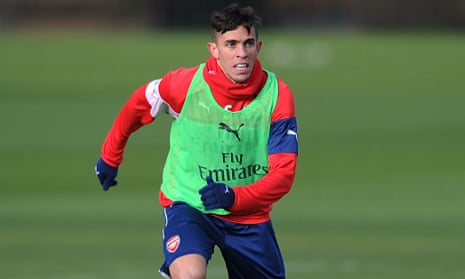For Arsène Wenger, the eyes still have it. The Arsenal manager is convinced that the personal touch in player scouting remains decisive. But he also revealed how the football data analytics company that the club bought in December 2012 had helped with the £11.3m signing of the centre-half, Gabriel Paulista, from Villarreal this week, albeit very reluctantly.
“I cannot tell you all but he has good stats,” Wenger said, when asked whether Gabriel had been spotted via the numbers, which StatDNA, the US-based business that Arsenal purchased for £2.2m, supply. Was that a yes then, Arsène? “It is not a no,” he replied.
The exchange shone a light on Wenger’s scepticism about the primacy of StatDNA’s work, which involves detailed analysis of players around the world. The company’s acquisition was driven by Ivan Gazidis, the Arsenal chief executive, who had wanted to make the club’s scouting processes more robust. The StatDNA database can respond to search terms and bring up what it decrees to be the best options in various positions.
With Gabriel, the 24-year-old Brazilian who, according to Wenger, is likely to be a substitute against Aston Villa at Emirates Stadium on Sunday, there appeared to be contention over how he was identified.
Wenger was certainly keener to speak, in general terms, about how the observations of his scouts had to come first. The computer-generated statistics were merely a means of reinforcing judgment.
But Wenger did discuss how he had monitored Gabriel by his numbers and how StatDNA had mitigated the potential risks. “We look at interceptions, defensive errors, winning tackles – what we call tackles is committing to win the ball,” Wenger said. “Set piece receptions, these kind of things. The most important thing is through the eye.
“Does this system find players for us? That is what we look for, of course, because it is difficult to watch all the games. But what I mean is that if the numbers confirm the eye, it gives you more.
“If a guy [scout] comes home and says: ‘I’ve seen a good player,’ you can statistically observe this player for five, six, seven games. You send him again, he comes back and says he’s a good player‚ the numbers confirm it, you can say the risk is limited. Though there is always a risk.
“We have our own system [through StatDNA], with qualities we think are important. After that, you have the attitude of the player. Because you can have good stats for a while but if you go out every night until six o’clock in the morning, it won’t last.”
Wenger has no concerns over Gabriel’s commitment. He described him as a typically aggressive Brazilian defender, whose priority was to defend, rather than maraud forward, David Luiz-style. He feels that Gabriel is quick and, at 6ft 2in tall, blessed with the size and strength to succeed in English football. It is a bonus that he can also play at right-back and left-back.
“Gabriel is a different style to David Luiz,” Wenger said, with reference to the maverick former Chelsea player, who is now at Paris St-Germain. “David Luiz looked more like a defensive midfielder than a centre-back because of his level of concentration and his dynamism going forward.
“Gabriel is a more typical defender. He is a real defender, who wants to defend. He’s from São Paulo. He’s a Paulista. You have Rio players and you have São Paulo players. One is a beach area [Rio] and the other is more hard-working.”
Gabriel speaks no English and only a bit of Spanish, having been at Villarreal for just 18 months. Wenger speaks most languages but not Portuguese and there are few Portuguese speakers at the club. Wenger could think of only Dick Law, the transfer fixer and Joe, who works at the training ground. It was imperative, he said, that Gabriel worked hard at his English lessons.
“He does not speak a word of English and that can cost you goals,” Wenger said. “If you mix going forwards with backwards, it can cost you. It is a position where you need to know your partners and you need to communicate as well. We try to teach him the important words. Like ‘Offside.’ And ‘Look at the linesman’.”
Wenger has only previously signed one Brazilian centre-half and that was back in 1995, when he brought Alexandre Torres to Nagoya Grampus Eight in Japan. Torres is the son of Carlos Alberto, the 1970 Brazil World Cup-winning captain, and Wenger has good memories of the deal.
“He was a very good centre-back,” Wenger said. “He still comes here [to the Emirates.] I’d gone to watch another centre-back and I had so many tapes that I watched them in the hotel, and I saw him. I asked: ‘Who is he? Bring this guy, I want to take him.’ The next day, he came with a guy and I looked at him and said: ’I know your face from somewhere.’ It was Carlos Alberto, who also worked as his agent.”
